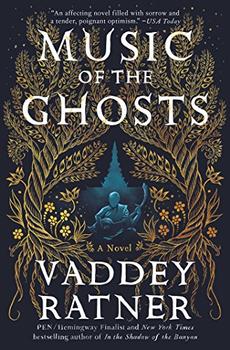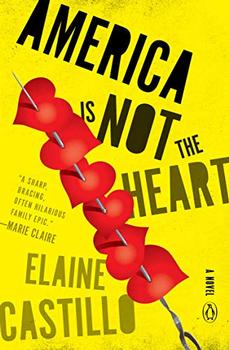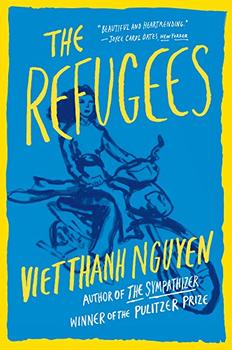Summary | Excerpt | Reading Guide | Discuss | Reviews | Beyond the book | Read-Alikes | Genres & Themes | Author Bio

This "novel of extraordinary humanity" (Madeleine Thien, author of Do Not Say We Have Nothing) from New York Times bestselling author Vaddey Ratner reveals "the endless ways that families can be forged and broken hearts held" (Chicago Tribune) as a young woman begins an odyssey to discover the truth about her missing father.
Leaving the safety of America, Teera returns to Cambodia for the first time since her harrowing escape as a child refugee. She carries a letter from a man who mysteriously signs himself as "the Old Musician" and claims to have known her father in the Khmer Rouge prison where he disappeared twenty-five years ago.
In Phnom Penh, Teera finds a society still in turmoil, where perpetrators and survivors of unfathomable violence live side by side, striving to mend their still beloved country. She meets a young doctor who begins to open her heart, confronts her long-buried memories, and prepares to learn her father's fate.
Meanwhile, the Old Musician, who earns his modest keep playing ceremonial music at a temple, awaits Teera's visit. He will have to confess the bonds he shared with her parents, the passion with which they all embraced the Khmer Rouge's illusory promise of a democratic society, and the truth about her father's end.
A love story for things lost and restored, a lyrical hymn to the power of forgiveness, Music of the Ghosts is a "sensitive portrait of the inheritance of survival" (USA Today) and a journey through the embattled geography of the heart where love can be reborn.
He feels his way in the confined space of the wooden cottage, hands groping in the dark, searching among the shadows through the blurred vision of his one good eye for the sadiev. The lute has called out to him in his dream, plucking its way persistently into his consciousness, until he's awake, aware of its presence beside him. His fingers find the instrument. It lies aslant on the bamboo bed, deeply reposed in its dreamlessness. His fingers inadvertently brush against the single copper string, coaxing a soft ktock, similar to the click of a baby's tongue. The Old Musician is almost blind, his left eye damaged long ago by a bludgeon and his right by age. He relies much on his senses to see, and now he sees her, feels her presence, not as a ghostly apparition overwhelming the tiny space of his cottage, nor as a thought occupying his mind, but as a longing on the verge of utterance, incarnation. He feels her move toward him. She who will inherit the sadiev, this ancient ...
Introduction
As Music of the Ghosts opens, Teera's beloved aunt Amara, the only link to her traumatic childhood escape from the atrocities of the Khmer Rouge genocide, has just passed away. Now, she must return to her homeland to rediscover a family legacy.
At age thirty-seven, Teera is in many ways a stranger to this new Cambodia and the stories it holds. In addition to fulfilling her promise to return her aunt's ashes to Phnom Penh, she has been called by a letter from a half-blind man, the Old Musician, who is searching for a peace he can't find in the temple compound where he earns his keep by playing for ceremonies and funerals. Still, the Old Musician and the young woman are bound by history, and the ...
Here are some of the comments posted about Music of the Ghosts in our legacy forum.
You can see the full discussion here.
Consider the modern children in the book; how do you feel they are affected by the legacy of the war and genocide?
The modern children will always be affected by the legacy of the war and the genocide. It is imperative that they never erase history in an attempt to forget, for choosing ignorance over truth allows history to repeat itself. The goal of any ... - MarieA
Difficult reading
I found this book to be difficult to read. After much thought about the plight of the country and its people, I realized the difficulty was in the fact that I have avoided this era in my selection of reading materials. I personnally thought the ... - janee
Do you see Teera and Narunn recreating new, non-traditional families for themselves in the war's aftermath? What "families" did you find throughout the novel?
Teera and Narunn have bonded in what most of the Cambodians recognized as marriage, and then the little girl comes along to complete that family. Yara opens her heart and her home and creates a large family filled with love. It is the bonding and ... - reene
Do you think choosing to forget is helpful or hurtful for the Cambodians? Is the same true of other war-torn nations?
Choosing to forget may be helpful in that it provides for a certain degree of functionality, moving on- which is a triumph against the depraved perpetrators. However, in the long run it is not beneficial to humanity to forget the atrocities and the ... - donnag
Do you think Mr. Chum becomes a father figure for Teera during her visit to Cambodia?
I could never picture Chum as a father figure to Terra. He was an integral part of her journey, but to me his role was one of a silent spiritual protector. That person who listens quietly with a non-judgmental presence. In my mind she lost her father... - janee
Throughout Music of the Ghosts, Ratner is thematically focused on the healing from "the killing fields"—for individuals, the country, and the culture. This recovery requires a balance of punishment and forgiveness. Certainly there are individuals who are guilty and need to be brought to justice. But how many others lie somewhere between guilt and innocence? As the two voices weave in and out of each other's past and present, Music of the Ghosts gives a nuanced and intimate view of Cambodia and its history. We see the strands of choice and circumstance laid bare and can only marvel at the resilience of the Khmer people...continued
Full Review
 (859 words)
(859 words)
(Reviewed by Chris Fredrick).
 Kevin Powers, author of The Yellow Birds
A book like this doesn't come around very often. I hope everyone will read it.
Kevin Powers, author of The Yellow Birds
A book like this doesn't come around very often. I hope everyone will read it. Madeleine Thien, winner of the Scotiabank Giller Prize and author of Do Not Say We Have Nothing
Music of the Ghosts is a novel of extraordinary humanity in the face of unforgivable culpability ... Vaddey Ratner speaks to the choices confronting all of us, and she does so with compassion, forewarning and courageous wisdom.
Madeleine Thien, winner of the Scotiabank Giller Prize and author of Do Not Say We Have Nothing
Music of the Ghosts is a novel of extraordinary humanity in the face of unforgivable culpability ... Vaddey Ratner speaks to the choices confronting all of us, and she does so with compassion, forewarning and courageous wisdom. Tatjana Soli, author of The Lotus Eaters and The Forgetting Tree
A powerful examination of the burdens of survival. Ratner writes with precision and lyricism about lives damaged in one of the darkest episodes in history. A timely, redemptive work.
Tatjana Soli, author of The Lotus Eaters and The Forgetting Tree
A powerful examination of the burdens of survival. Ratner writes with precision and lyricism about lives damaged in one of the darkest episodes in history. A timely, redemptive work. Viet Thanh Nguyen, author of The Sympathizer and winner of the Pulitzer Prize
Music of the Ghosts is a moving and often gripping exploration of Cambodia's Khmer Rouge regime and its aftermath. Ratner relentlessly shows the devastating impact of traumatic history on families and the nation, but leaves us with a carefully measured hope for insight and renewal.
Viet Thanh Nguyen, author of The Sympathizer and winner of the Pulitzer Prize
Music of the Ghosts is a moving and often gripping exploration of Cambodia's Khmer Rouge regime and its aftermath. Ratner relentlessly shows the devastating impact of traumatic history on families and the nation, but leaves us with a carefully measured hope for insight and renewal.Traditional Cambodian music plays a key role in Music of the Ghosts. Hearing it triggers memories for both of the story's main characters, and three hand-made instruments—a single-stringed lute, an oboe, and a drum—set the plot in motion.
Music and Buddhism have a strong connection; music is sometimes seen as a ceremonial offering to the Buddha. An estimated 95% of Cambodians are Buddhist today, and the roots of Buddhism date back to the 5th century. Over that long history, Buddhist songs have been adapted for use in ceremonies such as weddings and funerals, playing an integral role in common cultural practices.
The lyrics of traditional musical pieces often have a moral or religious theme. The smoat (also smaut or smot) ...

If you liked Music of the Ghosts, try these:

by Elaine Castillo
Published 2019
With exuberance, grit, and sly tenderness, here is a family saga; an origin story; a romance; a narrative of two nations and the people who leave one home to grasp at another.

by Viet Thanh Nguyen
Published 2018
Viet Thanh Nguyen's The Sympathizer was one of the most widely and highly praised novels of 2015. Nguyen's next fiction book, The Refugees, is a collection of perfectly formed stories written over a period of twenty years, exploring questions of immigration, identity, love, and family.




A library is a temple unabridged with priceless treasure...
Click Here to find out who said this, as well as discovering other famous literary quotes!